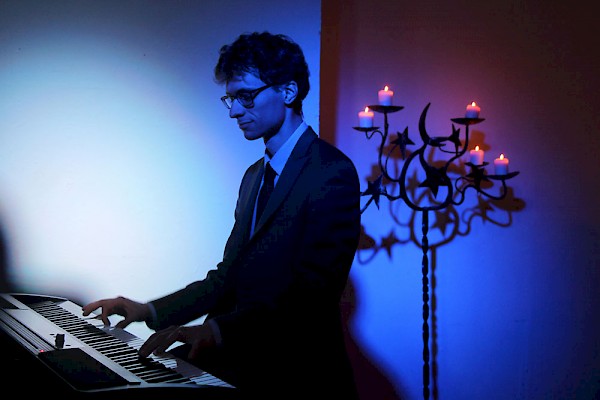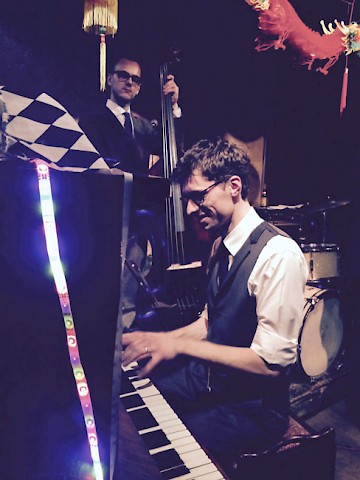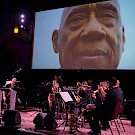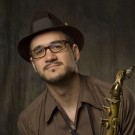 Photo by Clayton Harley
Photo by Clayton Harley
Back in 2008, pianist Andrew Oliver was an effusive force in the Portland jazz scene. An inventive and original player, he was not afraid to push the envelopes of style and composition, thanks to the counsel and coaching of famed Rose City pianists Randy Porter and Darrell Grant. His early-career recording, Otis Stomp, pulled together some of the city’s best ensemble players for a truly inspired 12-song romp (eight penned by Oliver) about which one Jazzscene reviewer said, “This record is a delight, the playing outstanding, and the fact these guys are young doesn’t hurt either. They tip the hat to the masters, yet never play it safe. They’ve gone to school, but still bring something new to the party. These kids are dangerous. I can’t wait to see what they do next.”
Oliver has never looked back. Not one to let the grass grow under his piano’s sustain pedal, he produced two CDs for that inaugural sextet, jetted off on a U.S. State Department trip to Africa, founded a new ensemble called The Kora Band that featured Kane Mathis on the 21-stringed African kora, and earned various prestigious awards, grants and scholarships for composition and performance.
Other bands followed, including Tunnel Six (which has toured the U.S. and Canada numerous times) and The Ocular Concern. In his spare time, he co-founded the Portland Jazz Composers Ensemble, for which he also served as executive director. And on and on and on.
Cut to July 2013. Oliver, restless and eager to push his own career forward, followed his wife to London, where she had taken a counseling job with The American School. He saw it as one more step in a career that would find him uprooting the, albeit quiet, success he’d had in a relatively small city (but perhaps large by jazz standards) to possibly find success in the thrum and bustle of a large European city.
By phone, in his customary crisp, staccato vocal delivery, Oliver talked about his expatriation, what he’s found in this foreign music scene, and how much he misses Portland.
 The move for his wife was good, and he was in no way reluctant to pass up such impetus and opportunity. “I realized there was loads of music to be done here,” he says. “I was up for a change. I felt like I had accomplished a lot in Portland, but I had hit a plateau that I felt like I was stuck at. I thought it was a nice opportunity to participate in a different scene. And I hadn’t lived in another city since I finished school, which I wanted to do. It worked out for both of us.”
The move for his wife was good, and he was in no way reluctant to pass up such impetus and opportunity. “I realized there was loads of music to be done here,” he says. “I was up for a change. I felt like I had accomplished a lot in Portland, but I had hit a plateau that I felt like I was stuck at. I thought it was a nice opportunity to participate in a different scene. And I hadn’t lived in another city since I finished school, which I wanted to do. It worked out for both of us.”
Oliver, who spent time at Portland State University studying composition with Charles Gray by day and sponging up the technique and style of drummer Mel Brown, guitarist Dan Balmer and pianist Tony Pacini by night, wasted little time in finding work.
In London, he says, “There are a lot more musicians and a lot more work. Way more work. It’s huge. It’s a particularly good time right now in London. Things had been on a little bit of a downturn in Portland, with all the venues closing as I was leaving. What I found here that’s surprising is swing music. It’s really popular at the moment. There are a lot of young people who like to go out dressed up in vintage clothes and listen to swing music.”
Oliver fell easily in with the genre, forming his own band, The Dime Notes, and playing with various other groups, including the Old Hat Jazz Band, and in duos and quartets with clarinetist Dave Horniblow.
Though swing helps keep his datebook full, he hasn’t abandoned his contemporary jazz pursuits. Three music schools in London are producing a tremendous number of great jazz players, he says, but it’s taken a bit longer for him to crack the scene. He’s worked his way into the popular Vortex Jazz Club, as well as several well-established jazz series that are finding favor. “They’re usually in the upstairs rooms of neighborhood pubs,” he says. “It does take a fair amount of time to get around so there tends to be a bit of a neighborhood vibe.”
Not unlike Portland in the vibe department, he’s also found that there’s an intrepid spirit to chase new musical ideas without concern for monetary recompense. “There are people here who are super world-class, right? One of the things I always appreciated about Portland was that the top-level players are really amazing. Portland’s always been lucky to have such high-quality musicianship even compared to other West Coast cities. Here, people are always up for doing stuff. They have enough gigs that they can find time during the day to play and work on new stuff.”
One avenue for modern jazz is Oliver’s trio, Rubik, which helps satisfy his need for piano trio jazz. With Tim Fairhall on bass and Jon Desbruslais on drums, the three exhibit an intense desire to squeeze every ounce of energy out of the pieces they perform. As with Tord Gustavsen’s expansive trio offerings, Rubik displays a deft and sensitive touch in each and every exploration—listen below.
Oliver has no immediate plans to return to the States, but doesn’t rule out the possibility. In the meantime, he has his hands full with steady work, plenty of chances to explore jazz, and the opportunity to expand his talents. He will tour through our area in March with the Tunnel Six band and do an album release with The Kora Band on Saturday, March 28 in the ballroom at The Secret Society—listen to the first track from the band's third album, New Cities, below.
Truth be told? He misses Portland. “It’s really dirty here,” he says. “Just because of the size of the city, it’s inevitably filthy. And I miss my family and friends. The nature scene here is cool, though, but it takes a while to get to, unlike Portland.”
As for the jazz scene, he’s found a vibrant and vital home.




